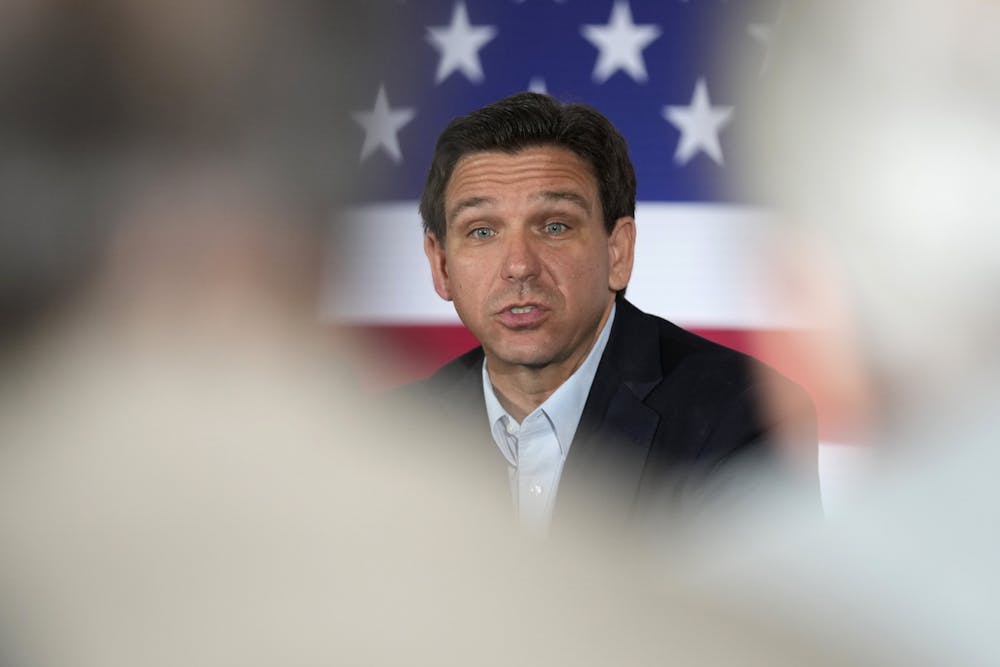The Alachua County Republicans hosted a watch party for the first Republican Presidential Debate, where Gov. Ron DeSantis touted his track record as the “education governor,” his handling of COVID-19 and his anti-abortion platform.
Matthew Pesek, a 31-year-old Gainesville resident and UF graduate, went to the event and was among 12 party members who attended in support of DeSantis Wednesday night.
“You can clearly see that he understands deeply and can think critically about issues rather than just repeating some talking points,” he said.
DeSantis ranks at roughly 15% among Republicans in the polls, placing him at a distant second to former President Donald Trump, who has nearly 52% of Republican-backed support.
The debate aired at 9 p.m. on Fox News. DeSantis stood alongside seven other prospective Republican presidential candidates: Vivek Ramaswamy, Mike Pence, Chris Christie, Nikki Haley, Tim Scott, Doug Burgum and Asa Hutchinson.
DeSantis, who left the stage unscathed by his opponents, discussed his views on education, COVID-19 lockdown restrictions, abortion, border control and climate change throughout the two-hour debate.
When asked by debate moderators Bret Baier and Martha MacCallum about the country's education system, DeSantis touted his impact on Florida's education.
“The decline of education is one of the main reasons our country is in decline,” DeSantis told the crowd in Milwaukee.
He referenced his recent elimination of critical race theory and gender ideology instruction in Florida K-12 schools through controversial legislation, like the expansion of the Parental Rights in Education Act, which critics call “Don’t Say Gay,” and his goal to “increase civic understanding and knowledge of the country.”
“We can’t be graduating students that don’t have an idea of what it means to be an American,” he said.
For Pesek, DeSantis’ focus on education could have a lasting positive impact on his family. His family is zoned for a school he said he wouldn’t feel safe sending his 19-month-old daughter to.
However, when DeSantis signed a bill opening school choice by eliminating financial eligibility restrictions for vouchers for Florida K-12 students March 27, Pesek took a sigh of relief.
“It's going to be life changing,” he said. “I can actually send my daughter to a school that's going to set her up for success.”
DeSantis also addressed the backlash he received for reopening schools no later than Aug. 31, 2020, after COVID-19 was declared a global pandemic March 11, 2020. He reaffirmed the decision helped students and families continue to learn and work.
“I can't imagine for the states that were shut down for a year,” Pesek said. “There's no recovering from that.”
Although Pesek said DeSantis is skilled at gaining consensus on controversial issues, he said the governor must engage with a more diverse base of viewpoints to become the sole Republican nominee. DeSantis’ decision to stop appearing on networks like CNN and MSNBC was a critical error, he said.
“He needs to show people that don't line up with Republican views that he is a consensus builder — that there are issues they will agree with him on,” he said.
Paulina Trujillo, a 21-year-old political science and women’s studies UF senior, serves as the public relations director for UF College Democrats. She watched the debate to see how the Florida governor fared on stage, she said.
Trujillo said the Parental Rights in Education Act and DeSantis’ arguments against Advanced Placement curriculum that promotes “woke” ideology are among his key talking points for the Republican voter base.
“Florida has been gaining a lot of attention recently, if you talk to anyone from other states,” she said. “I feel like most people know his name, even though most people wouldn’t know governor’s from other states.”
Despite the positive reaction from DeSantis’ supporters, Trujillo said his stance on academic freedom and state curricula is damaging — and could continue on a national scale if elected president. Last year, Trujillo feared her women’s studies major would be removed before HB999 was altered to keep the area of study, and counterpart bills SB266 and HB1035 were passed.
“I've been talking to a lot of teachers I had in high school and professors,” she said. “A lot of people are leaving the state. I definitely think we're going to see a brain drain.”
DeSantis also reconfirmed his anti-abortion stance when he mentioned his signing of the Heartbeat Protection Act April 13, which prohibits abortions if the unborn child has a detectable heartbeat.
While a few of his opponents shared their missions to pass a national abortion ban, DeSantis said it would be tough to accomplish.
Tim Marden, chairman of the Alachua County Republican Party, said although the county organization won’t publicly support a Republican candidate until a sole winner is elected, having a Florida governor on stage does carry some weight for Florida voters.
“If you equate it to knowing a football player that was in college that makes it to the NFL, you do have a certain connection, which I think does raise the level of interest for Floridians,” he said.
The next Republican Presidential Debate is Sept. 27 in Simi Valley, California.
Contact Sophia at sbailly@alligator.org. Follow her on Twitter @sophia_bailly.
Sophia Bailly is the Fall 2024 University Editor. She interned for The Times-Picayune in Louisiana this past summer as a Capitol News Bureau reporter. When she's not reading the news, she can be found listening to podcasts, going for a run or studying Russian.






